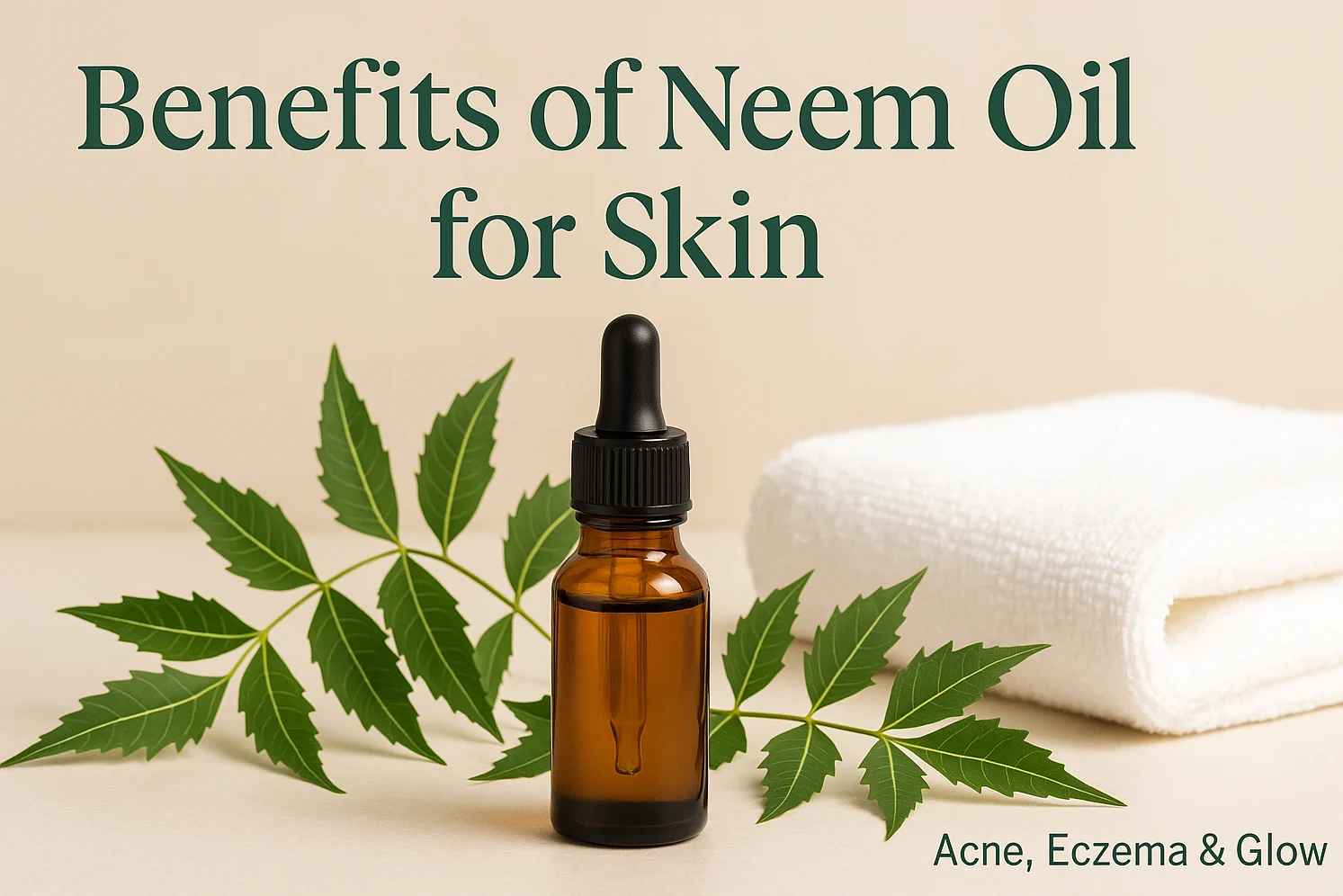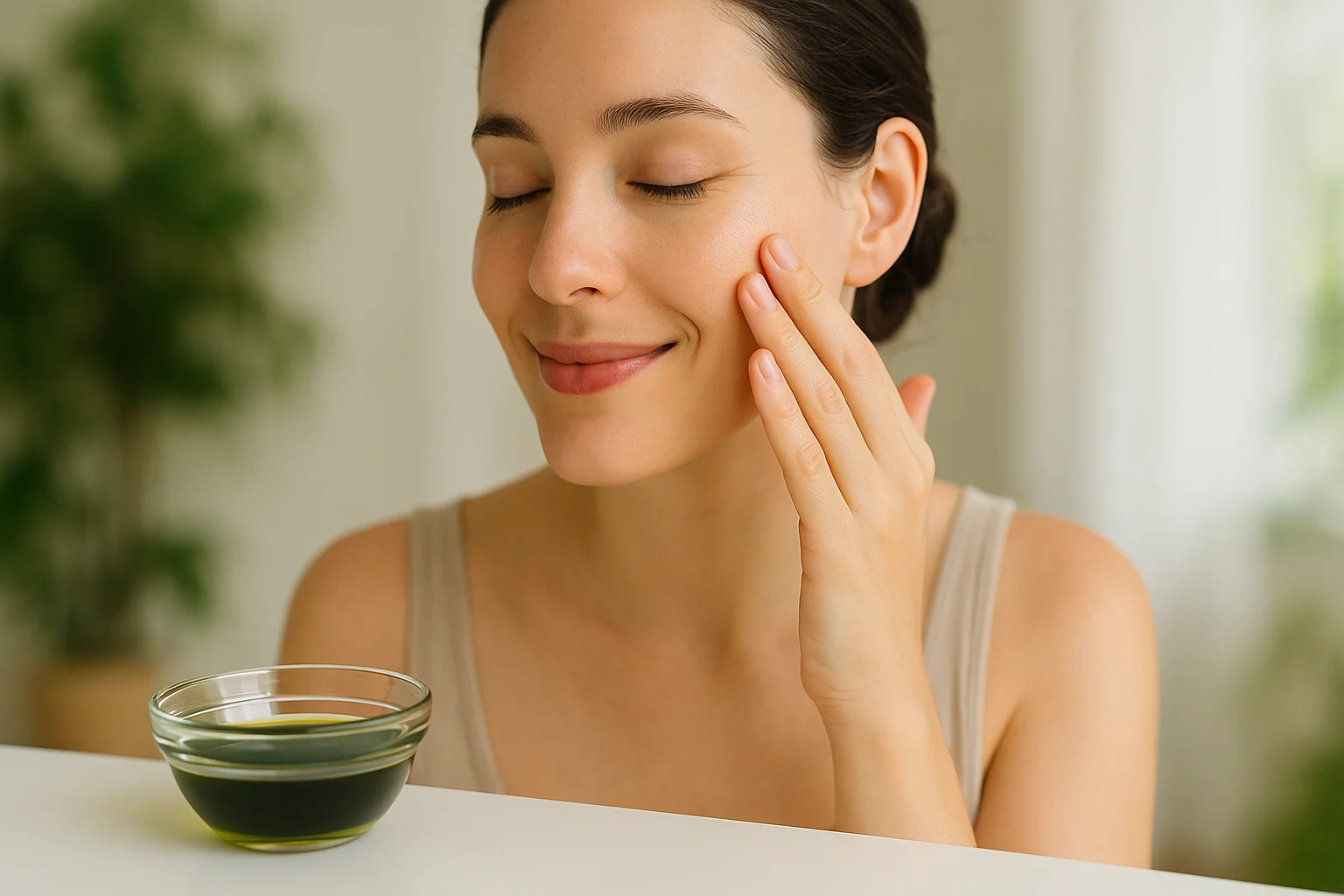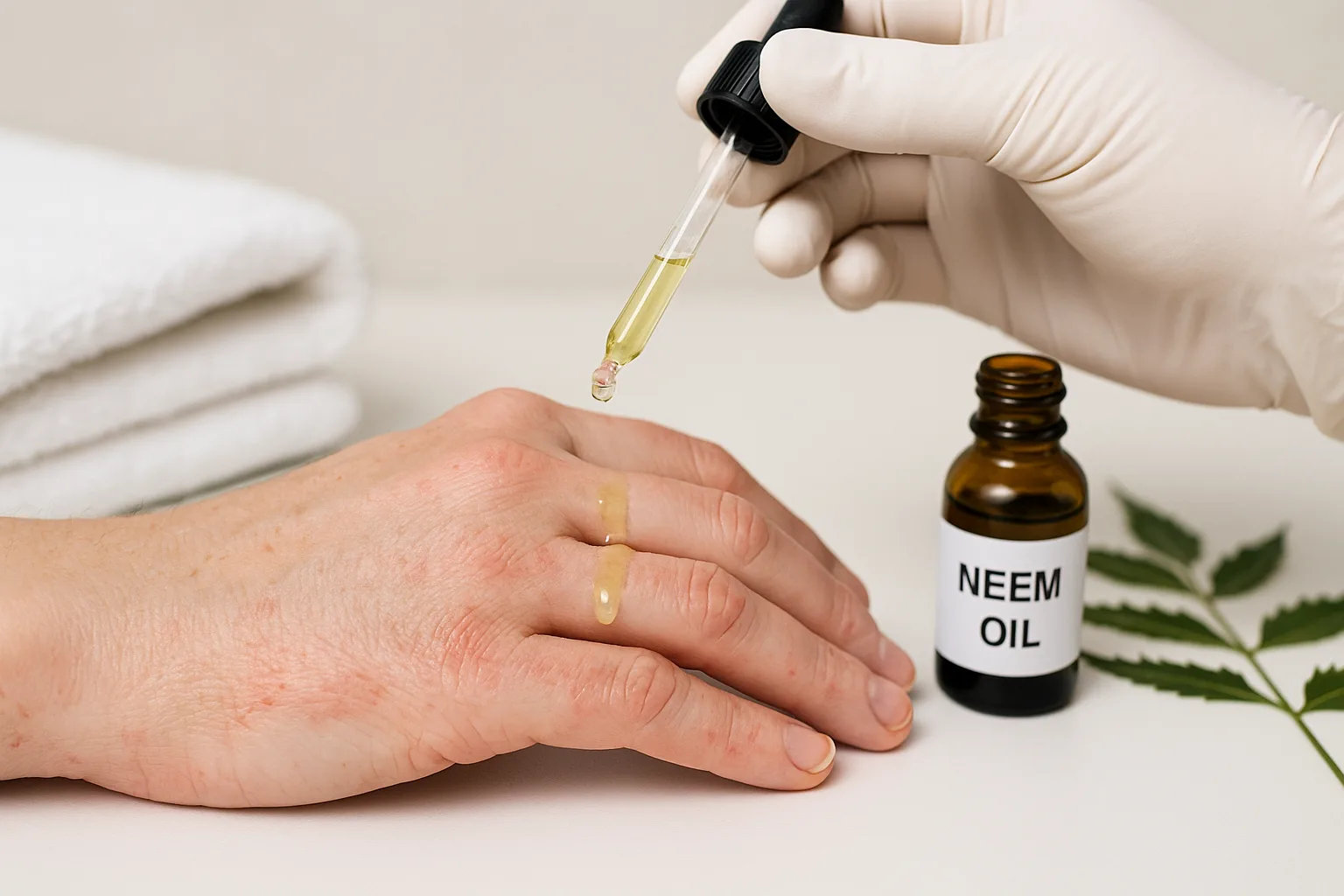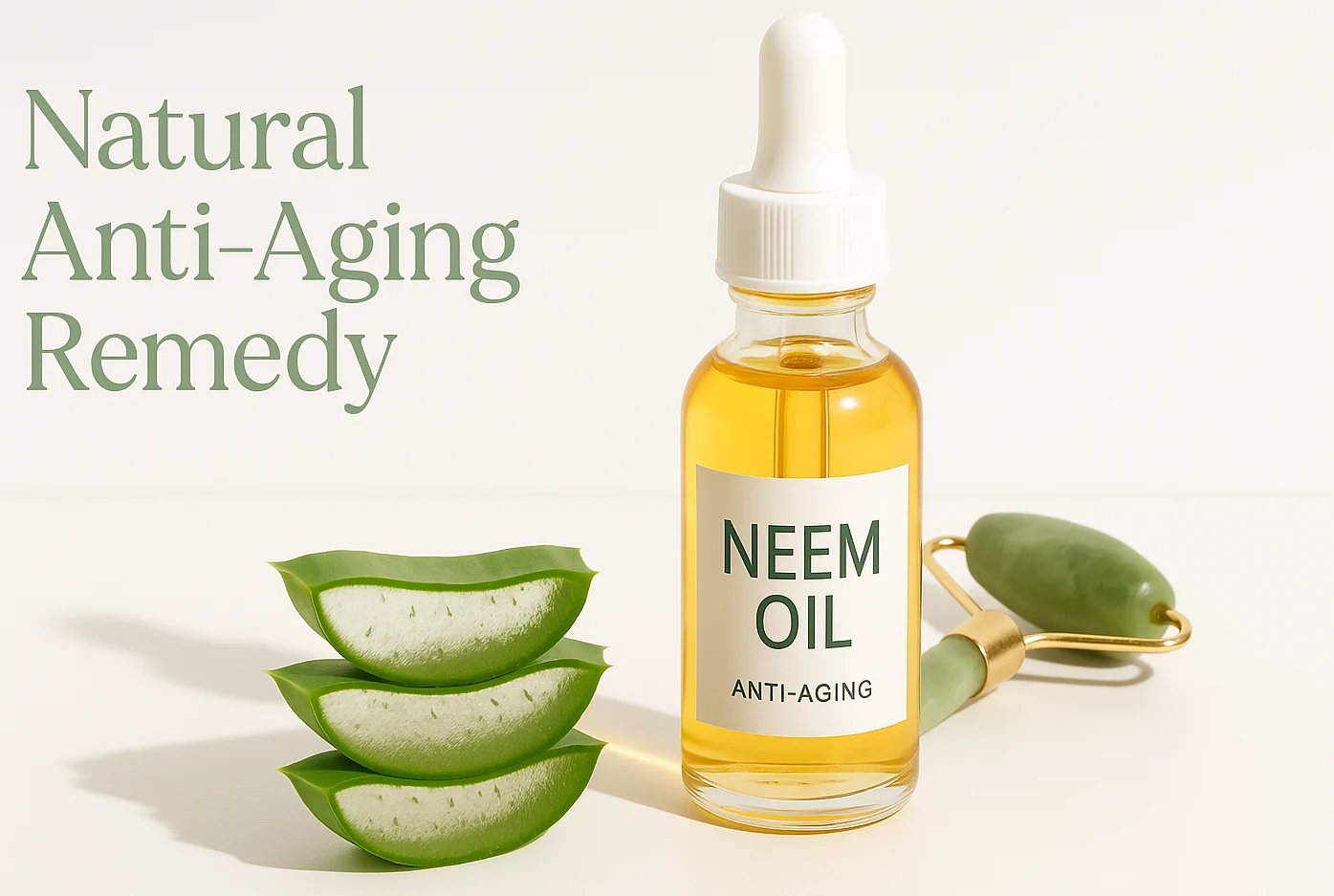
Unlock the benefits of neem oil for skin with a natural remedy rooted in Ayurvedic tradition. This plant oil may help with stubborn acne, soothe irritation, and hydrate dry patches—an easy upgrade to your neem oil skincare routine. Backed by centuries of traditional use and early research, diluted neem oil may help with breakouts and visible signs of aging. Curious how it fits into a broader Ayurvedic approach to healing and skin care? Explore our ayurvedic wellness guide for a complete look at natural practices that support radiant skin. Let’s dive in!
Discover Your Neem Solution!This page contains paid/affiliate links. As an Amazon Associate we earn from qualifying purchases, and we may earn commissions from other partners—at no extra cost to you. Links marked with ‘#ad’ are affiliate links, meaning we may earn a commission at no extra cost to you. Learn more.
Table of Contents
Key Takeaways: Benefits of Neem Oil for Skin
- Antimicrobial support: Helps keep bacteria and fungi in check—useful for a mindful routine.
- Soothing potential: May take the edge off redness and dryness tied to eczema or psoriasis.
- Hydration help: Fatty acids and vitamin E can nourish dry, flaky areas.
- Antioxidant care: Helps neutralize free radicals, which may soften the look of fine lines.
- Safety first: Dilute and patch test before wider use to minimize irritation.

Why Neem Oil? Benefits of Neem Oil for Skin Explained
Pressed from the seeds of the neem tree (Azadirachta indica), the oil shows up often in Ayurvedic skin care. Tradition calls the tree “Sarva Roga Nivarini.” The oil contains compounds like azadirachtin and nimbin. Research is exploring skin uses and complementary Ayurvedic herbs such as manjistha, but more human studies would help.
Neem oil has long been used to calm irritated, inflamed skin.
Top Benefits of Neem Oil for Skin
Fighting Acne with Antibacterial Power
Acne, which involves bacteria like Cutibacterium acnes, may be easier to manage with diluted neem oil. Since stress can worsen acne, try yoga for stress relief alongside your topical routine.
How It Works
- Antibacterial: Helps target acne-associated bacteria, which may reduce breakouts.
- Anti-inflammatory: Eases redness and swelling so pimples feel less sore.
- Pore-clearing: May help dial down excess sebum and dead-skin build-up.
Practical Applications
- Spot treatment: Apply diluted neem oil to pimples for focused care.
- Face mask: Mix with clay or aloe vera for a quick cleanse.
- Body acne: Add to properly emulsified bathwater for chest and back care.
Daily Neem Cleanse (works alone or before spot care)
Quick, non-drying wash so your routine starts clean.
Product: Himalaya Purifying Neem Face Wash — gel cleanser with neem + turmeric.
Soap-free; SLS/SLES-free. Use 1–2× daily. Optional: follow with a well-diluted neem oil as a spot step. Patch test new products.
Soothing Eczema and Psoriasis
Diluted neem oil may help soothe dryness and discomfort associated with eczema and psoriasis.
How It Works
- Reduces inflammation: Nimbin is studied for calming effects.
- Barrier support: Helps moisturize to support the skin barrier.
- Microbiome balance: May help reduce the risk of bacterial overgrowth on compromised skin.
Practical Applications
- Topical use: Massage diluted oil into non-broken skin daily.
- Bath soak: Add emulsified oil to bathwater and discontinue if irritation occurs.
- Scalp relief: For scalp concerns, use as a short pre-wash massage.
For centuries, neem has been used to calm inflamed skin.

Deep Hydration for Dry Skin
Dry, flaky skin can benefit from neem oil’s hydrating properties, thanks to its fatty acids and Vitamin E—useful in Ayurvedic skincare routines.
How It Works
- Fatty acids: Oleic and linoleic acids help lock in moisture.
- Vitamin E: Vitamin E can help skin feel softer and more elastic.
- Emollient effect: Helps smooth rough spots so skin feels softer.
Practical Applications
- Moisturizer: Mix a small amount into lotion or dab on dry patches.
- Overnight care: Apply to hands or feet, then wear cotton gloves or socks.
- Chapped lips: Blend a drop into your lip balm as a protective layer.
Natural Skin Remedies for Fungal Infections
Compounds like nimbidol may show antifungal activity, which could support care for issues such as athlete’s foot.
How It Works
- Antifungal: May disrupt fungal cell processes and slow growth.
- Broad-Spectrum: Studied against dermatophytes and yeasts.
- Symptom Relief: Can ease itching and redness for some people.
Practical Applications
- Athlete’s Foot: Apply a 5–10% blend to clean, dry feet twice daily.
- Ringworm: Use on lesions and see a clinician for diagnosis.
- Nail Concerns: Care can take months; seek medical guidance.
Anti-Aging Benefits
Neem oil’s antioxidant profile makes it a thoughtful addition to natural skin care, offering protection from environmental stressors and possibly helping dark spots look less noticeable over time—an easy add to your natural skin remedies toolkit.
How It Works
- Antioxidants: Help mop up free radicals and may help preserve collagen.
- Skin renewal: With steady use, may smooth texture and even tone.
- Moisturizing: Helps skin feel more supple, which may soften the look of fine lines.
Practical Applications
- Facial serum: Mix with rosehip oil for nightly use.
- Mask: Combine with honey for a rejuvenating boost.
- Under-eye care: Apply a well-diluted blend sparingly beneath the eyes; avoid getting it into the eyes.

Potential Side Effects to Consider
Even with potential benefits, some people notice irritation. If your skin is sensitive, start around 0.5% dilution to lower the chance of redness. Allergic reactions are uncommon but possible, so patch testing matters. Skip broken skin and check in with your clinician if you’re pregnant or breastfeeding.
How to Use Neem Oil Safely in Ayurvedic Skin Care
Keep things gentle and safe. If you enjoy a holistic approach, pair your routine with Ayurvedic teas.
Dilution Guidelines
Avoid using neem oil straight from the bottle—it’s potent and can irritate skin. Mix with carriers like jojoba or almond.
- 1–2% for Face: About 1–2 drops per teaspoon of carrier oil.
- Up to 5% for Spots/Fungus: Up to 5 drops per teaspoon for short-term use.
- Up to 10% for Body Spots: Short-term use if tolerated; avoid face and sensitive areas.
Ready to choose a bottle? Here are three reliable neem oils for safe, consistent DIY blends.
Best Neem Oils for Skin (Top 3 Picks)
Top 3Cold-pressed picks to blend at ~1–2% for face and up to 5% for short-term body care. Always patch test.
Cliganic Organic Neem Oil
Great $/oz for face, body, and scalp DIYs; decant to a small amber dropper for facial blends.
- Best for: Routine users, masks, scalp care
- Format: 16 oz, cold-pressed
Kate Blanc Neem Oil
Easy to finish while fresh; ideal for 1–2% night blends and spot use.
- Best for: Facial blends, beginners
- Format: Small bottle, 100% pure
NOW Solutions Neem Oil
Low-commitment 1 oz bottle; helpful for first-time testing and occasional spot care.
- Best for: First-timers, spot treatment
- Format: 1 oz, seed oil
Favorite tool: BAIMEI Jade Roller & Gua Sha — nice for a quick de-puffing feel; use over a light serum for glide and avoid active breakouts.
Patch Testing First
Test diluted neem oil on a small area (e.g., inner arm). Wait 24–48 hours to ensure no irritation occurs.
Application Tips for Skin Concerns
- Acne: Dab on blemishes or use in a clay mask weekly.
- Eczema: Massage into damp skin to lock in moisture.
- Dry Skin: Add to lotion for daily hydration.
- Fungus: Apply twice daily consistently and see a clinician if it persists.
- Anti-Aging: Use as a nightly facial serum.
Storage Tips
Store neem oil in a cool, dark place in an airtight container; many bottles list a 1–2 year shelf life—check your label and replace if it smells rancid.
Your Skin Goal Matcher: Tailored Neem Oil Tips
Skin Goal Selector
Choose your main skin concern to get tailored neem oil advice.
Select a concern to see tailored neem oil tips.
Frequently Asked Questions
Conclusion: Neem Oil in Holistic Skin Care
Neem oil blends ancient wisdom with modern curiosity, offering skin-supporting benefits in neem oil skincare. From acne to visible signs of aging, it’s a versatile addition in Ayurvedic skincare. Dilute, patch test, and use consistently for best results. Explore yoga for mindful movement for holistic wellness.


